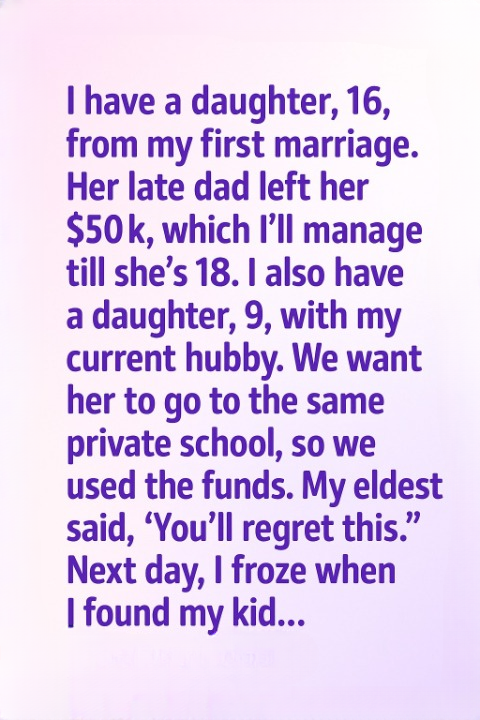I have a sixteen-year-old daughter from my first marriage. Her father passed away years ago, leaving her $50,000, which I’ve been managing for her until she turns eighteen. That money has always been her safety net, her father’s promise for her future.
I also have a younger daughter, nine, with my current husband. We wanted both girls to have equal opportunities, so we enrolled the youngest in the same private school as her older sister. Education was important to us.
We were struggling financially, as many families do. After much discussion, my husband and I decided to use part of the inheritance to cover tuition, hoping it would benefit both children.
When my eldest discovered this, her reaction was immediate and intense. She looked me in the eye and said, “You’ll regret this.” At the time, I thought it was just teenage anger and frustration.
The next morning, I walked into the living room and froze. There she was, sitting quietly with a packed suitcase beside her. Her eyes were swollen and red from crying.
She whispered softly, “Mom, I don’t feel like this is my home anymore.” Those words pierced my heart. I realized instantly this wasn’t just about money. It was about trust, memory, and her connection to her late father.
To her, that money wasn’t just funds—it was tangible proof of her father’s love, a promise he made for her future. Using it for another purpose felt like a betrayal, even if unintended.
I knelt beside her, holding her trembling hands, and tears streamed down my face. I told her I was sorry, that I never meant to hurt her, and that her feelings mattered more than anything else.
We spent hours talking, finally letting out months of unspoken pain and misunderstandings. She shared her fear of losing the last piece of her dad, and I listened, truly listening.
That evening, I spoke with my husband. We made a firm promise to repay every cent we had used, no matter how long it took or how many sacrifices it required.
We calculated budgets, cut back on luxuries, and even took extra work to ensure we could honor our commitment. It wasn’t easy, but it was necessary.
Slowly, the atmosphere at home began to shift. The tension eased just a little, and my eldest daughter started to open up again.
She still watches me carefully, her trust fragile and cautious. I know it will take time to rebuild completely, but we’re moving in the right direction.
I’ve learned a powerful lesson from this: love isn’t only about fairness or equality. It’s about understanding each person’s story and respecting their emotional needs.
Sometimes, the right choice isn’t the one that seems logically fair. Sometimes, the right choice is the one that honors memories and emotional bonds.
For my eldest, that money was more than money—it was a symbol of her father, of his care, of his enduring presence in her life.
I realized that true love is listening, recognizing each child’s feelings, and validating them, even when difficult decisions are made.
Now, our family is slowly healing. The girls are beginning to share moments of laughter, and my eldest is letting herself feel safe in our home again.
Ultimately, the greatest gifts we can give our children aren’t always tangible. Sometimes, they are understanding, empathy, and a place where their hearts feel heard and honored.
